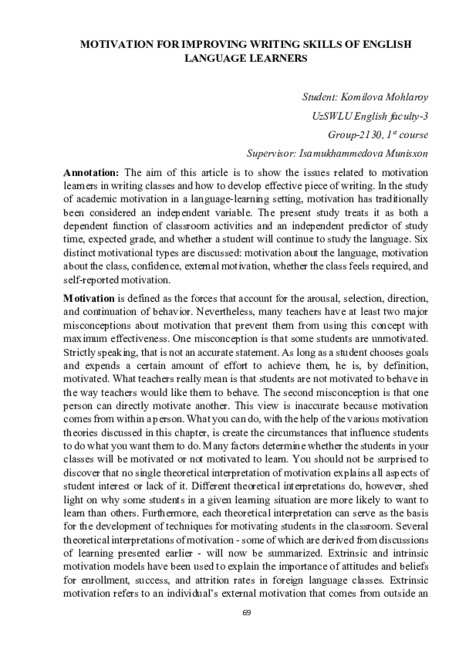
69
MOTIVATION FOR IMPROVING WRITING SKILLS OF ENGLISH
LANGUAGE LEARNERS
Student: Komilova Mohlaroy
UzSWLU English faculty-3
Group-2130, 1
st
course
Supervisor: Isamukhammedova Munisxon
Annotation:
The aim of this article is to show the issues related to motivation
learners in writing classes and how to develop effective piece of writing. In the study
of academic motivation in a language-learning setting, motivation has traditionally
been considered an independent variable. The present study treats it as both a
dependent function of classroom activities and an independent predictor of study
time, expected grade, and whether a student will continue to study the language. Six
distinct motivational types are discussed: motivation about the language, motivation
about the class, confidence, external motivation, whether the class feels required, and
self-reported motivation.
Motivation
is defined as the forces that account for the arousal, selection, direction,
and continuation of behavior. Nevertheless, many teachers have at least two major
misconceptions about motivation that prevent them from using this concept with
maximum effectiveness. One misconception is that some students are unmotivated.
Strictly speaking, that is not an accurate statement. As long as a student chooses goals
and expends a certain amount of effort to achieve them, he is, by definition,
motivated. What teachers really mean is that students are not motivated to behave in
the way teachers would like them to behave. The second misconception is that one
person can directly motivate another. This view is inaccurate because motivation
comes from within a person. What you can do, with the help of the various motivation
theories discussed in this chapter, is create the circumstances that influence students
to do what you want them to do. Many factors determine whether the students in your
classes will be motivated or not motivated to learn. You should not be surprised to
discover that no single theoretical interpretation of motivation explains all aspects of
student interest or lack of it. Different theoretical interpretations do, however, shed
light on why some students in a given learning situation are more likely to want to
learn than others. Furthermore, each theoretical interpretation can serve as the basis
for the development of techniques for motivating students in the classroom. Several
theoretical interpretations of motivation - some of which are derived from discussions
of learning presented earlier - will now be summarized. Extrinsic and intrinsic
motivation models have been used to explain the importance of attitudes and beliefs
for enrollment, success, and attrition rates in foreign language classes. Extrinsic
motivation refers to an individual’s external motivation that comes from outside an

70
individual with rewards such as money or grades. These types of rewards provide
satisfaction and pleasure that the task itself may not provide.
Motivation about the Language in particular is positively associated with several
outcomes of interest. Writing has always been seen as an important skill in English
language acquisition produce a well-thought-out piece of writing goals of ESL
students is to learnt. Because one of the important It is also a complex process and
can lead to learner frustration. Learning to compose an effective piece of writing can
be rather difficult unless students are given instruction as to what effective writing
involves and also offered practice chances to apply the basic conventions of writing.
Any writing program which is merely based upon a certain view may not reflect the
true nature of writing. Additionally ,writing skill can be developed when the learners
interests are acknowledged and when they are given frequent opportunities to actually
practice writing. As with speaking, it is necessary to provide a supportive
environment for the students and be patient.
References:
1.
Hedge
T
1988
Writing
Oxford
University
Press
Krashen SD
Writing : Research, theory and applications
Pergamon Press Kroll
B 1990
Second Language Writing: Research insights for the
2.
classroom
Cambridge
University
Press
Raimes A 1983
Techniques in teaching writing
Oxford University Press
3.
K. A., Bachrach, J. E. & Posey, S. K. E. (2008).
Learner Interest and
Achievement Motivation.
In Maehr, M. L., Karabenick, S. & Urdan, T. (Eds),
4.
Мусурманова, О., et al. "Педагогик атамалар луғати: ўзбек, рус, инглиз
тилларида." Т.:“TURON_IQBOL (2019).
5.
Палуанова, Халифа Дарибаевна. "Изучение экологических единиц в
английском языке." (2016): 72-72.






